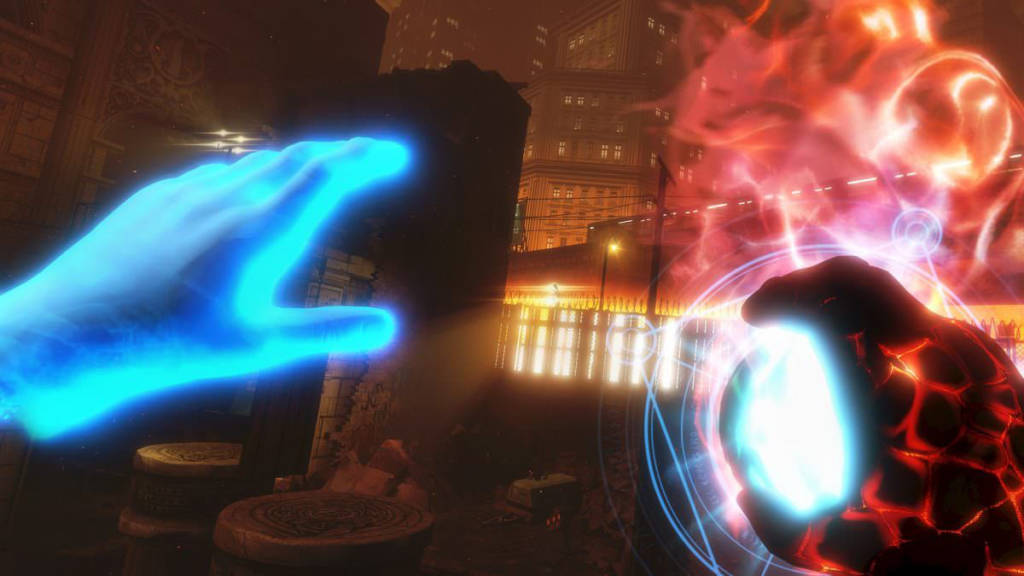Intel has partnered with Oculus and ESL on the inaugural VR Challenger League. The companies are launching a pair of online tournaments featuring Insomniac Games’ The Unspoken and Ready At Dawn Studios’ Echo Arena across North America and Europe with more than $200,000 in cash and prizes available. The online competition will have four regional finals spread across Oculus Connect on October 11-12 in San Jose, ESL One Hamburg October 28-29, IEM Oakland November 18-19 and DreamHack Winter November 30-December 3. All of this leads to the final event at Intel Extreme Masters (IEM) at Katowice, Poland in March 2018.
Jeffrey Clark, director of business strategy for gaming and esports at Intel, told AListDaily that the company wants to give competitive VR gaming a genuine global platform to showcase the possibilities to the esports community.

“Intel has been an active participant in esports for well over a decade,” Clark said. “We launched Intel Extreme Masters in 2006, developing it into a global entity with a passionate fan-base in the tens of millions in terms of online viewership. Over the years, we’ve worked with our partner ESL to push the boundaries to expand and evolve the esports experience, so it seemed only natural that we would pioneer one of the world’s first competitive VR tournaments. IEM offers the biggest global stage for esports, and we’re actively exploring the best way to integrate competitive VR.”
Intel piloted an initial competitive experience of The Unspoken at the first IEM Season 12 stop in Sydney this past May.
“Technology is our ethos—it’s at the very heart of our brand,” Clark explained. “We’ve been investing in gaming and esports for years and the emergence of VR and competitive VR gaming introduces an exciting new dimension to the world of esports. We’ve built relationships with game studios over the years, and VR is forcing developers to modify their approach to game development. A truly immersive VR experience, one that’s photorealistic and life-like where you genuinely feel like you’ve entered into a different domain, requires things like advanced physics and spatial audio. We’ve collaborated with developers like Ready at Dawn, Insomniac Games and others to expose these capabilities by helping them take better advantage of the CPU’s compute performance.”
Clark said Intel is committed to accelerating competitive VR gaming as well as the global growth of esports.
“One of the reasons Intel is excited about VR esports is because it adds a new dimension to the spectator experience,” Clark said. “So far, only a small percentage of the global esports audience has had the opportunity to view a competitive virtual reality title in VR, but for those that have, the experience is—more often than not—transformative. Most hardcore esports enthusiasts already have the hardware necessary to experience VR, and our view is that the emergence of VR esports will help accelerate VR’s adoption. Of course, for those that don’t have the necessary hardware, our belief is that VR provides a compelling reason to upgrade to a VR-ready system with the latest Intel 7th Generation Core processor (or 8th Generation later this year).”
Each season, Intel’s goal is to make IEM even more exciting and experiential for fans.
“Continuing to give attendees access to the latest technologies in PC gaming and VR is something we’re very proud of, and Oculus has been a key partner in bringing VR to massive audiences at IEM,” Clark added. “This year, Intel is integrating the latest VR technologies throughout the events, and part of that is with Oculus, including on-site VR tournaments, new interactive demos, and viewing experiences to let fans see firsthand what VR can enable. On the competitive front, we will host one of the VR Challenger League qualifiers with Oculus and ESL at IEM Oakland, and the championship will play out at IEM Katowice. We can’t wait to bring that spectator experience to fans in ways they haven’t seen before.”
The total prize pool for the VR Challenger League is over $200,000 in cash and prizes, distributed during qualifying stages and the finals.
“Prizing is a key part of esports and is a great motivator, but we also see it as a way to recognize the players’ achievements and investments,” Clark said. “IEM offers very competitive prize pools, but our focus is also on offering a consistent lineup of quality events which fans can expect year after year, to foster growth in the esports industry, and provide a stage for innovation and competition. VR esports are no different. VR is still fairly new so VR esports adoption will take time to grow, as will prize pools. VR esports has the ability to open up competitive gaming to a whole new segment of gamers, so recognizing their efforts and commitment to establishing VR esports with proportionate prize pools as the category grows will be important.”
Clark believes competitive VR gaming represents a new frontier in esports.
“Intel’s view is that VR esports has a future, but we acknowledge that it may take time, continuous innovation and investment before VR esports attracts a similar level of attention from major professional teams that traditional esports currently enjoys,” Clark said. “Games like The Unspoken, Echo Arena and the upcoming Sprint Vector from Survios are blazing new trails and inspiring a new breed of esports content. However, we will likely need a critical mass of HMDs in the market before the competitive VR genre can take the next big leap.”
Clark added that broader HMD adoption could be the catalyst that drives an increase in player-vs-player esports content, improvements to the spectator experience, and the building of VR esports communities, leagues and infrastructure.
“All of these things happening together should bolster the credibility, the excitement and enthusiasm of VR esports. Once that happens, we would expect to see more professional teams developing competitive VR talent and establishing dedicated teams,” Clark added.
Content drives esports and titles like CS:GO, League of Legends, DOTA 2 and Overwatch, which have built loyal fan bases consisting of hundreds of millions of global gamers because the gameplay and competitive components are compelling.
“The other key component is the spectator experience, and that was a big factor in Intel wanting to work with Insomniac Games and Ready at Dawn,” Clark explained. “Each of the studios developed their respective titles with esports in mind, which really helped distinguish them as best-of-breed games in this emerging genre. We collaborated with the studios during the development stages to ensure that The Unspoken and Echo Arena could tap into the incredible performance of our Intel Core i7 processors to deliver the highest quality, most immersive games. Both of those titles feature a fantastic blend of competitiveness and immersiveness, but they’re also really fun to watch.”

